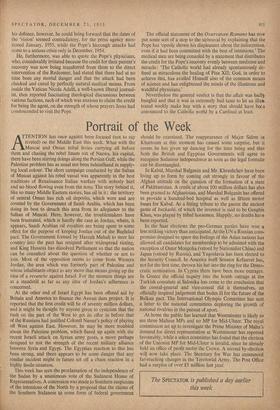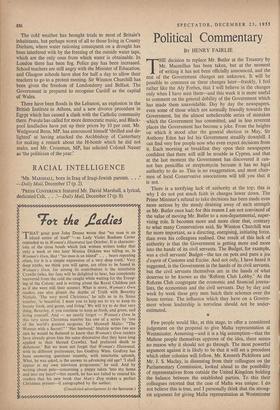Portrait of the Week
ATTENTION has once agairist been focused (not to say riveted) on the Middle East this week. What with the Muscat and Oman tribal levies carrying all before them and chasing the rebel Imam out of Nazwa, his capital, there have been stirring doings along the Persian Gulf, while the Palestine problem has as usual not been behindhand in supply- ing local colour. The short campaign conducted by the Sultan of Muscat against his rebel vassal was apparently in the best traditions of Renaissance Italian warfare with nobody hurt and no blood flowing even from the nose. The story behind it, like so many Middle Eastern stories, has oil in it: the territory of central Oman has rich oil deposits, which were and are coveted by the Government of Saudi Arabia, which has been doing its best to detach this area from its allegiance to the Sultan of Muscat. Here, however, the troublemakers have been frustrated, which is hardly the case in Jordan, where, it appears, Saudi Arabian oil royalties are being spent to some effect for the purpose of keeping Jordan out of the Baghdad pact. The Government formed by Hazzah Mahali to steer his country into the pact has resigned after widespread rioting, and King Hussein has dissolved Parliament so that the nation can be consulted about the question of whether or not to join. Most of the opposition seems to come from Western Jordan, the area which was formerly part of Palestine and whose inhabitants object to any move that means giving up the idea of a revanche against Israel. For the moment things are at a standstill as far as any idea of Jordan's adherence is concerned.
At the other end of Israel Egypt has been offered aid by Britain and America to finance the Aswan dam project. It is reported that the first credit will be of seventy million dollars, and it might be thought by anyone given to cynicism that the rush on the part of the West to get its offer in before that of the Russians had justified Colonel Nasser's policy of playing off West against East. However, he may be more troubled about the Palestine problem, which flared up again with the recent Israeli attack on Syrian army posts, a move perhaps designed to test the strength of the recent military alliance between Syria and Egypt. The Egyptian reaction to this has been strong, and there appears to be some danger that any similar incident might in future set off a chain reaction in a highly fissile situation.
This week has seen the proclamation of the independence of the Sudan by a unanimous vote of the Sudanese House of Representatives. A concession was made to Southern suspicions of the intentions of the North by a proposal that the claims of the Southern Sudanese to some form of federal government should be examined. The reappearance of Major Salem in Khartoum at this moment has caused some surprise, but it seems he has given up dancing for the time being and that both the British and Egyptian Governments will agree to recognise Sudanese independence as soon as the legal formulae can be disentangled.
In Kabul, Marshal Bulganin and Mr. Khrushchev have been living up to form by coming out strongly in favour of the Afghan attitude on the question of the formation of a state of Pakhtunistan. A credit of about 100 million dollars has also been granted to Afghanistan, and Marshal Bulganin has offered to provide a hundred-bed hospital as well as fifteen motor buses for Kabul. As a fitting tribute to the guests the ancient game of buzkashi, of which the inventor is said to be Genghis Khan, was played by tribal horsemen. Happily, no deaths have been reported. In the Saar elections the pro-German parties have won a less striking victory than anticipated. At the UN a Russian com- promise designed to spare the feelings of the Asian nations has allowed all candidates for membership to be admitted with the 'exception of Outer Mongolia (vetoed by Nationalist China) and Japan (vetoed by Russia), and Yugoslavia has been elected to the Security Council. In America itself Senator Kefauver has, not for the first time, thrown his hat into the ring for the Demo- cratic nomination. In Cyprus there have been more outrages. In Greece the official inquiry into the bomb outrage at the Turkish consulate at Salonika has come to the conclusion that the consul-general and vice-consul did it themselves, an officially inspired judgement that bodes ill for the future of the Balkan pact. The International Olympic Committee has sent a letter to the national committees deploring the growth of national rivalries in the pursuit of sport.
At home the public has learned that Westminster is likely to see three Maltese MPs and no MP for Mid-Ulster. The royal commission set up to investigate the Prime Minister of Malta's demand for direct representation at Westminster has reported favourably, while a select committee has found that the election of the Unionist MP for Mid-Ulster is invalid, since he already held an office of profit under the Crown. A second by-election will now take place. The Secretary for War has announced far-reaching changes in the Territorial Army. The Post Office had a surplus of over £5 million last year The cold weather has brought trials to most of Britain's inhabitants, but perhaps worst of all to those living in County Durham, where water rationing consequent on a drought has been interfered with by the freezing of the outside water taps, which are the only ones from which water is obtainable. In London there has been fog. Police pay has been increased. School teachers are still angry with the Minister of Education, and Glasgow schools have shut for half a day to allow their teachers to go to a protest meeting. Sir Winston Churchill has been given the freedom of Londonderry and Belfast. The Government is prepared to recognise Cardiff as the capital of Wales.
There have been floods in the Lebanon, an explosion in the British Institute in Athens, and a new divorce procedure in Egypt which has caused a clash with the Catholic community there. Pravda has called for more democratic music, and Black- pool landladies have put up their prices by 10 per cent. Mr. Wedgwood Benn, MP, has announced himself 'thrilled and de- lighted' at having attacked the Archbishop of Canterbury for making a remark about the H-bomb which he did not make, and Mr. Crossman, MP, has selected Colonel Nasser as 'the politician of the year.'



































 Previous page
Previous page